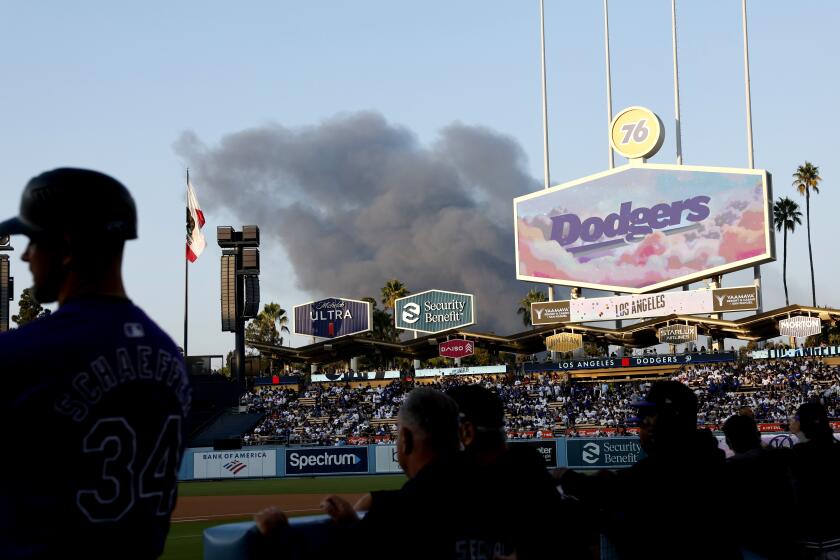Oil giant to fight greenhouse gases
SAN FRANCISCO -- Taking a new tack in his statewide campaign against global warming, California Atty. Gen. Jerry Brown announced a settlement Tuesday that requires ConocoPhillips to spend $10 million to offset greenhouse gases created by a proposed $600-million expansion of its East Bay refinery.
Brown told a news conference that the accord was believed to be the first time an oil refinery in the United States had agreed to mitigate increased carbon emissions from an expansion project.
To compensate for an initial emissions increase of 500,000 metric tons of carbon dioxide annually at its Rodeo facility, the oil giant agreed to fund a $7-million offset program under the Bay Area Air Quality Management District, a $2.8-million reforestation effort and a $200,000 wetlands restoration project.
In addition, ConocoPhillips agreed to identify all greenhouse gas emission sources and reduction opportunities at its California refineries, list energy savings measures for its Rodeo refinery and surrender a permit for a petroleum coke purification plant in Santa Maria. The plant emitted 70,000 metric tons of greenhouse gases annually until it was shut down this year.
Brown said the offsets were projected to be roughly equivalent to the increased emissions from the refinery expansion. And though calling the agreement “path breaking,” he acknowledged, “Relative to the problem [of global warming] we have a long way to go.”
Mark Ross, chairman of the Bay Area Air Quality Management District, said the agreement could translate into one-quarter to one-third of the reductions in greenhouse gas emissions in the Bay Area required by 2020 under the landmark state law, AB 32.
Ross said the projects to be funded by $7 million from ConocoPhillips have not yet been identified, though some are likely to be transportation-related, such as scrapping heavy-polluting junker cars and converting fleet vehicles to biofuel, hybrid or plug-in hybrid power.
“Seven million dollars to reduce that amount of tonnage will be a challenge,” Ross said. “This type of mitigation is just a start. This is a vanguard effort.”
Rand Swenson, refinery manager for ConocoPhillips in the Bay Area, said the company was pleased that it could proceed with the refinery project, which will include a hydrogen plant and will increase the state’s supply of cleaner-burning fuels by 1 million gallons a day. “This is good for the people of the state,” he said.
The agreement came after the attorney general’s office challenged the project in May by appealing to Contra Costa County officials and arguing that their environmental impact study failed to adequately evaluate and mitigate the global-warming effects.
The accord also followed last month’s settlement of Brown’s lawsuit against fast-growing San Bernardino County, which required it to measure how much the county’s long-term growth plan would contribute to global warming and to set targets for reducing greenhouse gas emissions.
More than a dozen local jurisdictions in California have received letters from Brown and, before he took office, then-Atty. Gen. Bill Lockyer that warned them to address global warming effects from development and transportation plans.
Brown has come under fire from Republicans for trying to address global warming before regulators adopt rules under the 2006 climate change law that are scheduled to be implemented in 2012.
Mary Nichols, chairwoman of the California Air Resources Board and a former air chief in Brown’s gubernatorial administration, said she had not seen the ConocoPhillips settlement but was briefed Tuesday by Brown in a phone call.
“The attorney general has lots of power,” she said. “And many companies are reluctant to litigate. Without having reviewed the settlement, I cannot comment on whether they are spending the same amount of money [she would want]. . . or spending it on things I would prefer” to offset greenhouse gas emissions.
Brown said the ConocoPhillips settlement was part of a necessary effort to prepare the state for the challenges that industries and government agencies will face in meeting greenhouse gas reductions under AB 32. “This is a significant but small step forward, and I hope we will see many more in the years to come,” he said.
Brown said his office also had filed comments that question the adequacy of the global warming part of the environmental impact report for a Chevron refinery project in the East Bay city of Richmond. Company spokeswoman Camille Preselac said the facilities were being upgraded, not expanded, but she declined to discuss comments from Brown’s office.
Tupper Hull, spokesman for the Western States Petroleum Assn., which represents major oil companies, said the group was pleased that ConocoPhillips was able to reach a deal to move forward but was concerned that Brown’s efforts could slow expansion of refinery capacity as transportation fuel demand was increasing.
“We are in uncharted waters in terms of making really ambitious greenhouse gas emissions goals in a way that does not unfairly disadvantage customers,” he said.
--
More to Read
Sign up for Essential California
The most important California stories and recommendations in your inbox every morning.
You may occasionally receive promotional content from the Los Angeles Times.










